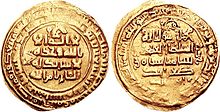Toghrul Beg
| Tughril | |||||
|---|---|---|---|---|---|

Coin of Tughril
|
|||||
| Sultan of the Seljuq Empire | |||||
| Reign | 1037 – 4 September 1063 | ||||
| Predecessor | empire established | ||||
| Successor | Alp Arslan | ||||
| Born | 990 | ||||
| Died | 4 September 1063 (aged 73) | ||||
| Spouse | Aka, daughter of Yusuf Qadir-Khan Altun Jan Khatun Seyyedeh Fatima |
||||
| Issue | None | ||||
|
|||||
| House | House of Seljuq | ||||
| Father | Mikail ibn Seljuq | ||||
| Religion | Sunni Islam | ||||
| Full name | |
|---|---|
|
Laqab: Rukn ad-Din (shortly) Kunya: Abu Talib Given name: Muhammad |
Tughril (Persian: السلطان رکنالدین ابوطالب طغرلبک محمد بن میکائیل بن سلجوق یمین امیرالمومنین;full name: Rukn al-Dunya wa al-Din Abu Talib Muhammad Toghrul-Beg ibn Mikail) also spelled Toghrul I, Tugril, Toghril, Tugrul or Toghrïl Beg; (990 – September 4, 1063) was the Turkic founder of the Seljuk Empire, ruling from 1037 to 1063. Tughril united the Turkic warriors of the Great Eurasian Steppes into a confederacy of tribes, who traced their ancestry to a single ancestor named Seljuq, and led them in conquest of eastern Iran. He would later establish the Seljuq Sultanate after conquering Persia and retaking the Abbasid capital of Baghdad from the Buyid dynasty in 1055. Tughril relegated the Abbasid Caliphs to state figureheads and took command of the caliphate's armies in military offensives against the Byzantine Empire and the Fatimid Caliphate in an effort to expand his empire's borders and unite the Islamic world.
Tughril was the son of Mikail ibn Seljuq; on the death of his father, Tughril and his brother Chaghri were raised by their grandfather Seljuk, who had other sons named Musa Yabghu and Arslan Isra'il, whom Tughril would later accompany into the Iranian plateau during his later life. Tughril ascended to power ca. 1016.
In the 1020s, Tughril and his other relatives were serving the Kara-Khanids of Bukhara. In 1026, the Kara-Khanids were driven out of Bukhara by the Ghaznavid Sultan Mahmud of Ghazni. This defeat made Arslan Isra'il flee to a place near Sarakhs, where he asked Mahmud for permission to settle in the area in return for military aid. Mahmud, however, had Arslan Isra'il imprisoned, where the latter soon died. Meanwhile, Tughril and Chaghri remained loyal to their Kara-Khanid overlords. Although they in 1029 had some disputes with the Kara-Khanids, they continued to support them, and still continued to participate in the Kara-Khanid wars against the Ghaznavids; in 1032, they were present at the Battle of Dabusiyya.
...
Wikipedia
